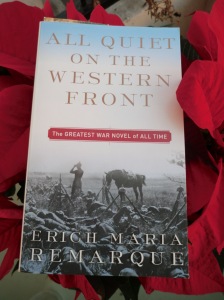A novel of the cruelty of war, the tenuousness of life and the impossibility of love.
I started reading this in July/August 2014, during the summer and to begin with I was fine with reading it, but by halfway I found myself not wanting to pick it up, the scenes described, horrific, grueling, they went on for too long, they were so vivid, my insides contracted each time I picked it up.
I read reviews, entered into discussions and debate about the necessity of being so exposed to such scenes as a way of understanding what men went through in war and I am not one to avoid that, but I couldn’t balance that intellectual point of view with the sickness I felt on reading this.
I was reading it on the kindle and at 50% I decided to stop and I picked up Vera Brittain’s Testament of Youth which I reviewed here, the true story of her wartime experience, some distance from the war but dealing with the effect of it, both in the hospitals where she volunteered and the letters from her fiance, brother and friends who were all fighting and who would all lose their lives.
Vera’s story brought meaning and understanding, empathy and insight, but it didn’t make me feel sick. Her life afterwards was affected by her experience in a positive way, it is a grand testament to a woman’s work and need to more than understand, but to make a contribution to try to change the world and our violent, destructive tendencies.
Richard Flanagan’s book then won the Booker Prize, so I tried again. I sped through the next 100 pages and had to pause again as that sick feeling refused to go away. So I stopped.
Today for the third and last time I picked the book up once again, but by now I could almost feel the pages of horror coming, whether it was Dorrigo trying to sew up his friends leg or watching the beating of a friend. And now I say enough. This book has many, many fans and has brought the author immense and deserved success, however, it doesn’t need my contribution and I don’t need to continue to torture myself by trying to read it, in the hope of some kind of enlightenment.
I read 65% and I am sure I missed out the redeeming parts of the book.
 I leave it there and will turn to Erich Maria Remarque’s All Quiet on the Western Front instead to conclude a year of anniversary reads for WWI.
I leave it there and will turn to Erich Maria Remarque’s All Quiet on the Western Front instead to conclude a year of anniversary reads for WWI.
Note: This was an ARC (Advance Reader Copy) kindly provided by the publisher via NetGalley.

